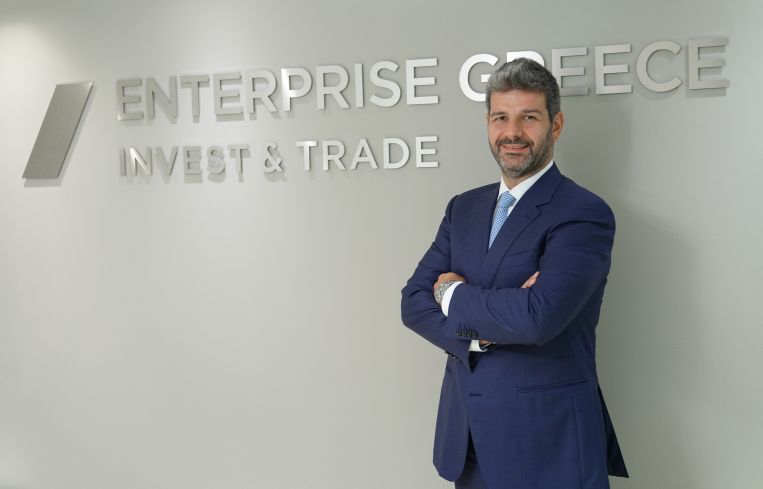Enterprise Greece’s Marinos Giannopoulos: 5 Questions
The CEO of Greece’s investment and trade agency talks at MIPIM about green development and the country’s past debt crises
By Nicholas Rizzi March 13, 2024 1:04 pm
reprints
The winds have shifted in Greece.
Nearly a decade ago, the country faced a massive debt crisis — needing a total of $343 billion spread out in three rescue packages from 2010 to 2015 — and a huge unemployment rates. Things have since turned around, with the country receiving an investment-grade rating from DBRS Morningstar last year and plenty of activity from international investors,The New York Times reported.
Part of that has been spearheaded by Enterprise Greece, an official government agency working to attract foreign investors and help Greek companies export their products. CEO Marinos Giannopoulos has led the agency since 2022.
A big push for Enterprise Greece has been green development. It has helped position Greece to become the European Union’s “green battery,” aiming to have its first offshore wind farm up and running before 2030, and recently saw Amazon finish its first utility solar power project in the country last year.
Commercial Observer sat down with Giannopoulos at MIPIM to talk about Greece’s recovery from the debt crisis, green development and data center construction.
This interview has been edited for clarity and length.
Commercial Observer: How has Greece been recovering from the debt crisis?
Marinos Giannopoulos: It took a lot of work, it was painful, it wasn’t easy. I think all the measures that the government, especially the current government [led by Prime Minister Kyriakos Mitsotakis], which is in its second term now, have taken since 2019 have really helped elevate Greece. We have investment-grade status now. We have received a surplus in GDP for the second year running.
All of that came with lots of hard work and lots of different sets of reforms that took place in the last five to six years, at least. We’re talking about digitalization, we’re talking about the cutting of red tape, we’re talking about different incentives for investments and a restructuring of how the government operates. Of course, there are things to be done, but the main thing is that part of that success is the stability and what the government has achieved for the second term running. People have faith in them, and investors have faith in the government.
Have you been finding it easier to get foreign investors now that things have stabilized to a degree?
Yes. Before it was more the ones that were willing to take more risks But now that we’ve become a success story, it’s obviously easier. The economy is getting better so you have more companies you can bring along, more enterprises and more success stories that we can actually promote and actually have something to say to investors.
A big drive now has been green development, namely solar power and wind power. Can you talk a little about that?
It was a big push and it’s the prime minister’s will to achieve for 2030 to 2050, zero carbon emissions [in Greece], so we’re on track for that. There’s a bid to essentially use different funds — state and EU funds — to go green and go digital. The specific set of tools for that is called the Recovery Resiliency Fund. We’ve got a green target that you have to achieve in order to get the loan. There are measures like that that help investments materialize with going green.
We are big on renewable energy. We are investing in wind farms. It’s something that we’re really proud of and we’re becoming a hub for energy for the Balkans and going into Central Europe.
We’re blessed with our location because it’s a geostrategic location. We connect the Middle East and Europe, so we’re the gateway — and, of course, having been blessed with the sun and wind and having been blessed with our resources.
Aside from the green development, what other projects have you been working on?
We’re actually becoming a digital hub. We have all three players from the U.S. — Google, Microsoft and Amazon — who have invested in big data centers. It’s a big thing to have all the three big players coming to Greece, and there’s always a bigger push for more companies to come and join the club.
In 2019, the government came in and said, “Why don’t we have any data centers in Greece?” They looked at the grid and they saw that they don’t actually have any cables. So they sat down and they designed how they’re going to go about doing it.
What’s next on the horizon?
The main sectors that we’re doing are energy, telecommunications and ICT [information and communications technology]. Obviously, real estate and tourism play a big part. Tourism is 30 percent of the GDP.
There are a couple of big projects. There’s a turn from the family-owned hotels to the big chains coming in. For example, Goldman Sachs is investing in a big project in the north of Greece. They’re starting a new chain of Goldman Sachs hotels from Greece, so you can see all the big brands coming. Four Seasons started investing in big projects, and you can see the turn of actual product from family-owned to big chains. So we want to make Greece a year-round destination.
Nicholas Rizzi can be reached at nrizzi@commercialobserver.com.



